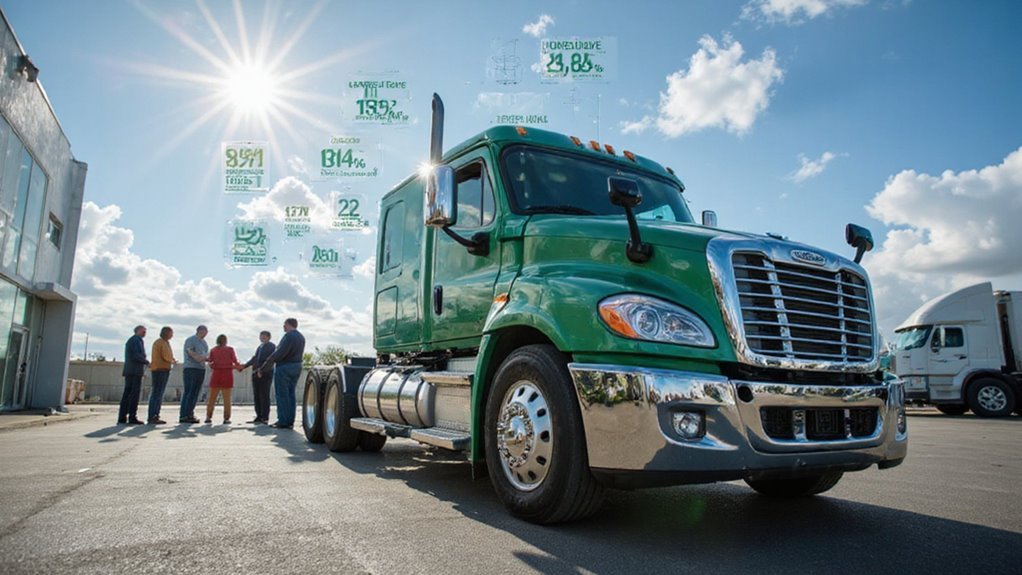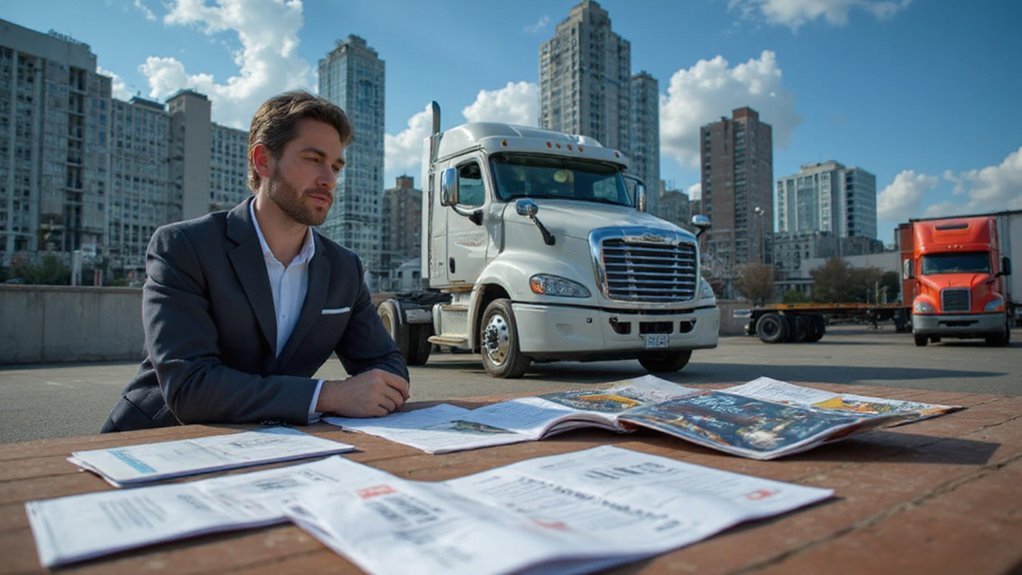If you’re eyeing commercial truck financing, expect rates from about 5% with manufacturers near 8% at banks, and much higher—up 75%—if you’re using online lenders who are less picky. Loan terms usually run 1 through 7 years, with down payments between 10% and 20%. Your credit score better be around 650+, and lenders will ask for your business history and financial paperwork. Curious about which lender fits you best and what fees might sneak in? Keep going, and you’ll find out!
Key Takeaways
- Interest rates for commercial truck loans typically range from 4.99% to 8%, varying by lender and creditworthiness.
- Loan terms commonly last between 1 to 10 years, with fixed rates ensuring consistent monthly payments.
- Eligibility usually requires a credit score of 650+, two years of business history, and proof of insurance.
- Traditional banks, online lenders, specialist companies, and dealer financing offer varied options and approval speeds.
- Typical down payments range from 10% to 20%, with additional fees like origination and application costs impacting total expense.
Understanding Typical Interest Rates for Commercial Truck Financing

While exploring commercial truck financing, one among the initial things you’ll want to wrap your head around is interest rates—they’re the secret sauce that can either sweeten your deal or leave a sour taste in your wallet. When delving into truck equipment financing, your creditworthiness plays a starring role in snagging approved rates. Traditional banks usually offer solid 6.5% to 8% interest rates, rewarding strong credit and steady business history, but getting through their application process can feel like jumping hoops. Online lenders offer speed and flexibility but watch out since their rates can spike up to 75%. Manufacturers financing, like Mack’s promo deals at around 4.99%, can be captivating but are often tied to specific models and tight terms. Additionally, down payment requirements generally range from 10-20%, which also influences the financing terms you receive. Many transport businesses also consider fleet equipment loans as a combined solution for multiple vehicle purchases. Remember, your down payment and loan terms also shape the rate you land—so choose wisely!
Loan Terms and Repayment Options for Truck Equipment
When you’re gearing up for financing a truck, understanding loan terms and repayment options isn’t just helpful—it’s essential for keeping your cash flow happy and your business running smoothly. Loan terms typically range from 1 to 10 years, with the truck itself acting as collateral. You’ll want to take into account fixed interest rates to keep your monthly payments steady—no surprises here! Your down payment usually falls between 10% and 25%, impacting those payments. Also, refinancing options can come to your rescue if cash flow gets tight. Keep in mind, your credit score influences rates and terms, so a better score means better deals. While application requirements involve paperwork, mastering this process helps you control costs and avoid those nasty budget headaches down the road. Understanding how to secure financing for your commercial vehicle is a key step in the process of getting the right loan for your needs.
Eligibility Criteria and Application Requirements
Since securing financing for your truck is a big step, you’ll want to know exactly what lenders look for prior saying yes. They check your credit score—usually 650 or higher, but some flexibility exists if you’re willing to pay a bit more in interest. Your business history also matters; two years in the game often opens doors. Expect to provide financial documents like bank statements, tax returns, and detailed equipment specifications. A down payment and proof regarding insurance are non-negotiable, protecting both sides. Lenders evaluate your whole profile, including collateral and cash assets. Loan terms typically range from 1 to 7 years, so it’s important to consider loan duration when planning your payments. Financing often covers new and used trucks, allowing businesses to access the right commercial truck equipment. If your credit isn’t perfect, lease-to-own programs might be your secret weapon. So, gather your paperwork, show your strengths, and get ready to accelerate your approval!
Different Types of Lenders and Financing Products

Choosing the right lender and financing product can feel like steering through a maze, but knowing your options makes all the difference. For equipment financing for trucking companies, you’ve got plenty of routes. Traditional banks offer solid transportation equipment loans with competitive rates but come with stricter credit requirements and a less simple application process. Specialist truck financing companies get your world—they deliver quicker approvals and flexible payment options customized for trucking. Online and alternative lenders accelerate things with prompt funding and fewer obstacles to jump through. Equipment financing and leasing providers let you preserve cash flow through various lease types, while vendor and dealer financing programs can bundle deals right at the sale, often easing credit challenges. Whether you want financing for new and used trucks, there’s a smart product waiting for you. LendingTree’s network offers over 30 business lenders, providing personalized matches based on specific trucking finance needs. Understanding the comparison of lenders can help you find the best fit for your commercial truck loan requirements.
Key Fees and Costs Associated With Truck Equipment Loans
Money matters don’t stop after you pick out your truck — the fees and costs associated with truck equipment loans can sneak up at you if you’re not careful. Beyond interest, you’ll face loan origination fees, application fees, and sometimes collateral-related charges. Don’t forget insurance—proof of coverage is a must before lenders hand over the cash. Processing costs and prepayment penalties can add layers to your total loan cost, making early payoff less tempting. If you find better terms, refinancing options can help improve your loan structure but may come with additional fees. And if refinancing calls, be ready for extra fees. Additionally, lenders typically require a down payment ranging from 10% to 20% of the loan value to secure the financing.
| Fee Type | Description | Impact upon Loan |
|---|---|---|
| Loan Origination Fees | Upfront charge for processing | Adds to upfront cost |
| Application Fees | Covers credit checks & appraisal | Slightly higher APR |
| Prepayment Penalties | Fees if you pay off early | Increases total cost |
| Refinancing Fees | Costs to restructure your loan | May reduce monthly pay |




